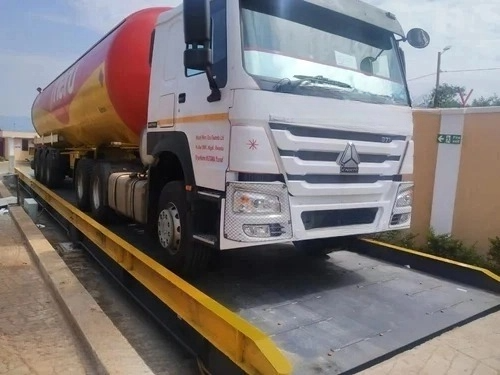Grain Weighing: Why Does It Matter for You?
Grains, as one of the most important agricultural products globally, are involved in various stages from the field to the market. During this process, accurate weighing of grains plays a crucial role.
Whether in agricultural production, storage management, or logistics, ensuring precise grain weighing not only affects product quality but also directly impacts the fairness and transparency of transactions. In this article, we will explore the relevant information about grain weighing to help you better understand its importance and provide strong support for your business.
Part 1. What is Grain Weigh?
Grain weighing refers to the process of measuring the weight of bulk grains such as wheat, corn, soybeans, and other agricultural products. This process requires the use of specialized weighing equipment, including truck scales, grain bulk weighers, and other precise systems, to ensure that each batch of grain is weighed accurately.
By utilizing advanced weighing technologies, businesses can ensure the correct weight for each batch of grain, which is crucial for fair transactions, quality control, and efficient logistics management.

Part 2. Why Does Grain Weighing Matters?
Grain weighing not only ensures fairness in each transaction, but also impacts agricultural production and logistics management on multiple levels. Here are some key reasons why grain weighing is important:
1. Ensuring Fair Transactions
In bulk agricultural product trading, accurate weighing determines the accuracy of transaction prices and delivery quantities. Any weighing errors could harm the interests of both parties.
By using high-precision weighing equipment, both parties can ensure transparency and fairness in transaction data, preventing disputes caused by errors.
2. Improving Production Efficiency & Inventory Management
For farms and storage companies, precise grain weighing helps in better inventory management. Real-time grain weighing enables businesses to track grain flow and adjust production and supply chain strategies in real-time. Automated weighing systems can also reduce manual operations, improve weighing efficiency, and minimize human errors.

3. Optimizing Logistics & Transportation
In the transportation of bulk grains, ensuring that vehicles are not overloaded or underloaded is crucial in saving costs and improving transportation efficiency.
Accurate weighing systems help logistics companies keep track of the weight of each batch of grain in real time, preventing safety risks and unnecessary expenses caused by overloading.
4. Ensuring Product Quality & Compliance
Grain weighing is not only the foundation of transactions but also a critical aspect of quality control. With precise weighing, businesses can better manage the quantity of each batch of grain, avoiding quality issues caused by weight discrepancies.
Particularly in regions with strict regulations on the weight and quality of agricultural products, using compliant weighing equipment ensures that products meet standards and can enter the market smoothly.
Part 3. Common Grain Weigh Equipment
1. Truck Scale
Truck scale is the most commonly used equipment for weighing bulk grain, especially for weighing trucks, large trailers, and other transportation vehicles. Truck scale typically consists of a platform and weighing sensors that can weigh the entire load of the vehicle in one go. It is widely used in farms, warehouses, and logistics centers.
- Advantages: Suitable for weighing large volumes of goods, high accuracy, and simple operation.
- Applications: Farms, warehouses, logistics transportation, grain trading, etc.
2. Grain Bulk Weigher
Grain bulk weigher is an automated weighing system designed specifically for bulk grain, capable of quickly and accurately weighing bulk grains. It is commonly used in large warehouses, processing plants, and wholesale grain markets.
Typically equipped with conveyor belts and automated control systems, it enables real-time grain transport weighing and generates detailed data reports.
- Advantages: Efficient, highly automated, reduces manual intervention, and quickly and accurately weighs large quantities of bulk grain.
- Applications: Grain storage, processing plants, wholesale grain markets, etc.

3. Electronic Scale
An electronic scale is typically used for small batches or on-site weighing. It can accurately and quickly measure small quantities of bulk grain, making it an ideal tool for small-scale operations in farms, trade markets, and other venues.
Electronic scales are compact and easy to use, providing precise weight measurements for single batches of grain.
- Advantages: Easy to use, portable, lower cost, suitable for on-site weighing.
- Application Scenarios: Small farms, vendors, on-site measurement, etc.
4. Multi-Function Weighing Systems
Multi-function weighing systems combine various weighing methods (such as truck scales, electronic scales, grain bulk weighers, etc.) to provide flexible weighing solutions tailored to different needs.
These systems typically include data analysis and reporting functions to monitor grain weighing across different stages.
- Advantages: Comprehensive functionality, flexible and high-precision options tailored to specific needs.
- Applications: Large agricultural enterprises, logistics companies, etc.
5. Belt Weighing System
Belt weighing system measures the weight of grain as it moves along a conveyor belt using sensors installed on the belt. It is ideal for continuous production processes that provide real-time monitoring of material flow and weight.
- Advantages: Suitable for continuous production and large-scale processing, high precision, real-time monitoring of material flow.
- Applications: Grain processing, storage, logistics, and other industries.
Part 4. Grain Weighing Technology & Solutions
With the advancement of technology, grain weighing technology has also evolved continuously. Modern weighing systems not only offer high precision, but also enable automation and data-driven management, greatly improving operational efficiency. Below are some common grain weighing technologies:
1. Automated Weighing Systems
Modern automated grain weighing systems significantly reduce manual operations, increasing grain weighing efficiency. With the use of sensors, conveyors, and other automated equipment, grains can be precisely weighed without human error on uninterrupted production lines.
2. Data Management and Traceability
Data management systems that are integrated with weighing equipment can record grain weighing data in real-time. This data not only helps businesses manage their inventory, but also helps with traceability, ensuring that the origin and destination of each batch of grain can be clearly tracked.
3. Remote Monitoring and Maintenance
Some advanced grain weighing systems have remote monitoring and maintenance functions. These systems allow operators to monitor equipment status in real-time via the internet and perform maintenance in case of faults, ensuring efficient operation.

Part 5. How to Ensure Accuracy of Grain Weighing?
1. Regular Calibration of Equipment
To ensure the accuracy of grain weighing, it is essential to regularly calibrate the weighing equipment. Only after professional calibration can the equipment guarantee that each weighing result meets the required standards.
2. Use of High-Precision Weighing Equipment
Choosing high-precision weighing equipment is crucial, especially in bulk commodity trading. Accurate equipment helps minimize human factors that affect the results and ensures fairness throughout the transaction process.
3. Enhanced Data Monitoring and Management
With advancements in technology, many grain weighing systems are now capable of integrating with data management systems, automatically generating weighing reports, and providing real-time monitoring of every stage of the weighing process. This systematic approach helps avoid errors and enhance operational efficiency.
In Summary: Bincen–Your Trusted Partner for Grain Business Success
Grain weighing is an essential aspect of agricultural production and logistics, affecting the fairness of every transaction and the efficiency of the supply chain. By using high-precision weighing equipment and advanced automation systems, businesses can not only improve operational efficiency and reduce labor costs, but also ensure product quality and compliance.
If you’re looking for efficient and accurate grain weighing solutions, Bincen is the partner you can trust. It provides the most suitable equipment and services to support the growth of your business.





